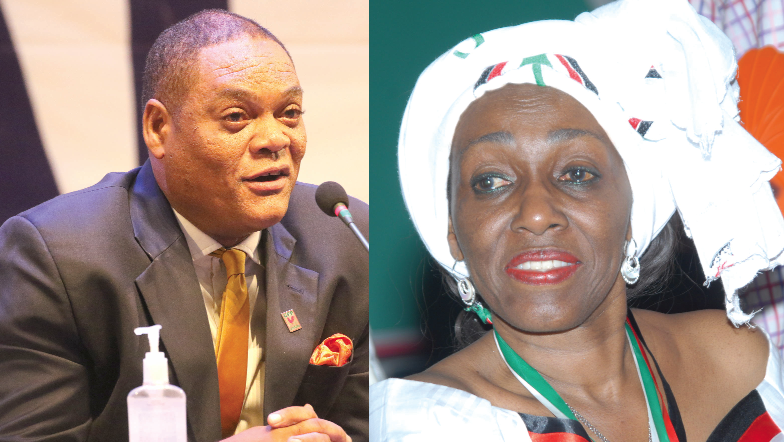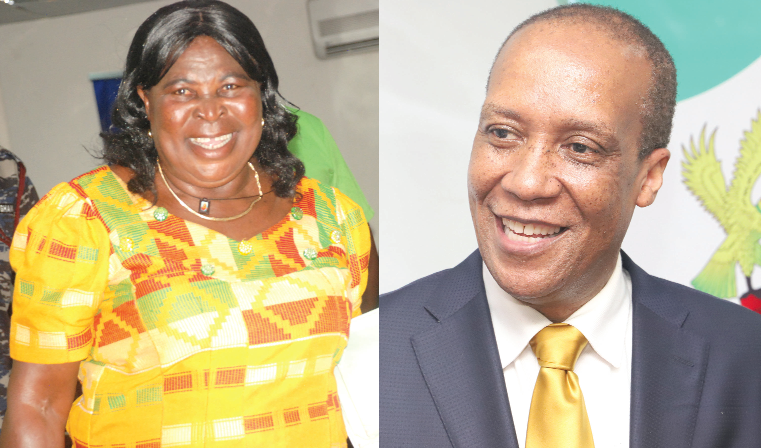
Election 2020: Greater Accra, must-watch region
The Greater Accra Region has been a swing region in the last seven elections, which makes it a must-watch in the December 7 general election.
Since December 7, 1992, the battle to win the Greater Accra has been very intense and the outcomes varied.
Advertisement
This year’s elections will be no different, as the region is heating up with the ramping up of political roadshows with sometimes burst into violent clashes between the National Democratic Congress (NDC) and the New Patriotic Party (NPP).
The two parties have dominated the country’s political landscape since the inception of the Fourth Republic in 1992. The People’s National Convention (PNC), which had participated in all the seven elections, had not made any major impact, leaving the electorate with only the NDC and the NPP to choose from, making the country almost a two-party state.
Although small in geographical coverage, the region has the highest number of provisional voter population of 3,590,805 million, out of the 16.9 million across the country. Its cosmopolitan demography, as it hosts the country’s capital, gives Greater Accra its character as a swing region and an ultimate decider for the Jubilee House.
The national capital, Accra, itself is considered a key battleground because, statistically, none of the parties has successfully been able to dominate election outcomes in the region.

Swing correlation
This is because the NPP won the region in 2000, 2004 and 2016, while the NDC won it in 1996, 2008 and 2012 — a perfect correlation that determines the winner of the national vote each time.
This year, again, the two major parties are leaving no stone unturned to win Greater Accra and ultimately clinch the Presidency.
A Senior Research Fellow and Head of Advocacy and Institutional Relations of the Institute of Democratic Governance (IDEG), Mr Kwesi Jonah, believes that the cosmopolitan nature of Greater Accra makes it difficult to predict its outcome.
In Ghana, the Ashanti and the Volta regions have been cited as areas where ethnic-based voting appears dominant.
This is evidenced by the massive support that accrues to the NPP and the NDC in those regions.
On the other hand, ethnicity does not seem to determine voter behaviour in cosmopolitan areas such as Greater Accra, where voting patterns remain erratic and unpredictable.
“It is the most cosmopolitan region in the country because all the ethnic groups are there, which makes it difficult to predict the region,” he said.
Urban city
The IDEG Research Fellow said the Greater Accra Region, being an urban industrial city accommodated the largest educated elite workforce, which did not vote the same way all the time but analysed issues carefully before voting.
The region’s tag as a key battleground is reinforced by the creation of additional regions.
The Brong Ahafo Region, which used to be a swing region for the two major parties, has been split into Bono East, Ahafo and Bono.

Trend analysis
Trend analyses show that Greater Accra has supplied the NDC more votes than any other region, including its traditional stronghold, the Volta Region.
In 2012, Greater Accra gave former President John Dramani Mahama of the NDC 1,125,751 votes, constituting 52.31 per cent of the votes from the region compared to the 734,641 votes the Volta Region, gave the NDC, constituting 85.47 per cent of that region’s votes.
Even in 2016, which was the NDC’s worst year, Mahama polled 918,476 votes, constituting 47.27 per cent, compared with the 576,883 from the
Volta Region.
In summary, about 58 per cent of constituencies in Greater Accra are either NPP or NDC strongholds.
The remaining 42 per cent are swing constituencies with an even leaner one for the two major parties. At the end of the day, winning the elections comes down to very small margins for NPP or NDC in the region.
Out of the 34 constituencies in the region, the NPP currently holds 12 seats, with higher votes than what the NDC gets in its stronghold constituencies in the region.
Umbrella seats
There are about nine constituencies in the region that traditionally vote NDC and are considered safe umbrella seats.
The constituencies are Ada, Ashaiman, Ningo Prampram, Sege, Kpone-Katamanso, Shai-Osudoku, Ayawaso East, Ayawaso North and Ablekuma South.
Elephant hold
The NPP, on the other hand, has consistently maintained a hold on some 12 constituencies. They are Anyaa-Sowutuom, Dome Kwabenya, Okaikwei South, Okaikwei North, Tema East, Tema West, Tema Central, Ablekuma North, Ablekuma West, Ayawaso Central, Weija Gbawe and Trobu.
Battleground constituencies
There are yet seven constituencies that are considered swing and key battlegrounds but which slightly tilt towards the NDC with a small margin. This is mainly because those seats have alternated between the two major parties.
The constituencies are Adenta, La-Dadekotopon, Ledzokuku, Madina, Odododiodoo, Klottey Korle and Bortiano-Ngleshie Amanfro.
That said, the Greater Accra plays the role of a great equaliser in the country’s electoral politics. The region leads the country in urbanisation and it is classified by many as a pure swing region with no advantages for either party.
NPP’s take
The governing NPP said it was ready and poised not just to win the Greater Accra Region, as it did in Election 2016, but also improve on its performance, reports Emmanuel Ebo Hawkson.
The Director of Elections of the party, Mr Evans Nimako, told the Daily Graphic that the NPP was leaving no stone unturned but was vigorously campaigning to achieve a “first victory”.
“The campaign is being run effectively by the regional campaign team, constituency campaign team as well as polling station campaign teams. Our reliable volunteers have been working round the clock to ensure victory,” he said.
According to him, the NPP deserved another term in office because the Akufo-Addo led administration had performed remarkably well for the Greater Accra Region and the country in general.
The NDC
The National Campaign Spokesperson for the NDC, Mr James Agyenim Boateng, said the NDC was poised to win the Greater Accra Region in the December 7 polls, as it would annexe all regions in the country, reports Kester Aburam Korankye.
He said by the calculations of the party, the Central, Western and Greater Accra regions would decide the outcome of the election, not just the Greater Accra Region.
“We are focusing a lot of attention on the Greater Accra Region with the retail campaign of the manifesto which is touching base with the people because it resonates with their aspirations,” he said.
Tailor made
Mr Boateng noted that the presidential candidate of the NDC, former President Mahama, was meeting with special groups and artisans in every constituency in the region with tailor-made messages.
He said unlike before when some constituencies were brought together at one location for the campaign, former President Mahama was visiting each constituency before the election.
That, he said, would help the party reach a larger number of people.
“So, he is meeting with mechanics, fishers, hairdressers and other artisans in their communities and that is helping the party to reach a larger audience because this campaign is more elaborate,” Mr Boateng noted.

We’ll cause upset
The General Secretary of the PNC, Ms Janet Nabla, said the party was poised to cause an upset in the Greater Accra Region in the forthcoming elections.
She told the Daily Graphic’s Emmanuel Bonney that the party would win the six seats it was contesting in the region and one seat in the Central Region.
The seats are Dome Kwabenya, La-Dadekotopon, Weija Gbawe, Ablekuma West, Ayawaso West Wuogon and Anyan-Sowutuom.
Ms Nabla said the party had fielded candidates from the grass roots who were regularly in touch with the people, adding that as part of the work, they were embarking on house-to-house, one-on-one and social media campaigns, among others, to reach out to the electorate.
“When we meet the people on the ground, they feel that we are part of them. The PNC is also reaching out because political party owns Ghana,” she said, adding that all the candidates the party was featuring knew their areas very well and could speak the language of the people.
“We have greater chances in the Greater Accra Region. When we go to the communities, for instance, the Zongo communities, we just did not pick anybody but those that are popular to represent the party.

“In Greater Accra, no party can claim ownership because the people are educated and they know what they want,” she said, adding: “We are sure of making an impact this year.”
Adding his voice to the discussions, the Deputy General Secretary of the PNC, Mr Farudeen Yakubu, said some of the candidates the party had
picked had contested in the previous elections and so were well known, and that “this has put them in a better position to win”.
Asked about the Presidency, he said that was going to be a one touch victory for the PNC’s presidential candidate, Mr David Apasera.
He said Mr Apasera was one of three former Members of Parliament (MPs) to contest the Presidency, the other two being President Nana Akufo-Addo and former President Mahama.
“The people have seen the other two former MPs and we think this is our time to take the Presidency. They all served at the leadership level and Ghanaians wanted such a person and we have brought him.
“Mr Apasera has a very good track record. For instance, when he went to the ECOWAS Parliament, he did well and this is well known,” he said.




